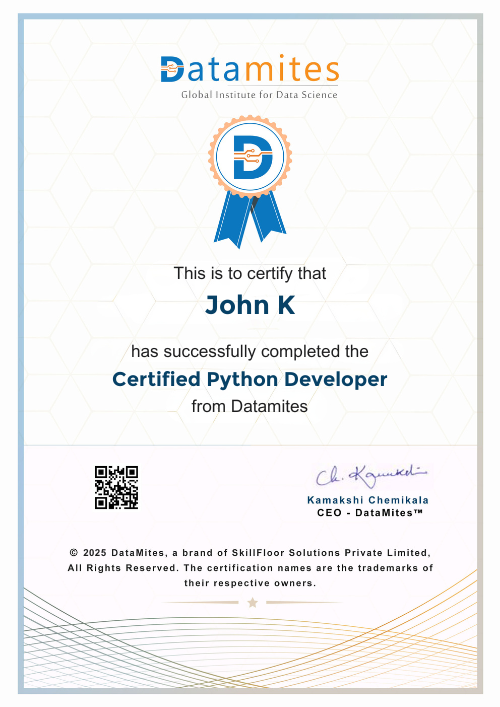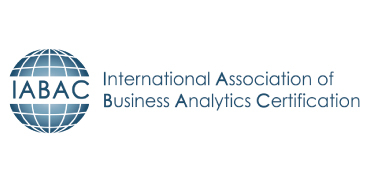Instructor Led Live Online
Self Learning + Live Mentoring
Customize Your Training

• Introduction of python
• Installation of Python and IDE
• Python Variables
• Python basic data types
• Number & Booleans, strings
• Arithmetic Operators
• Comparison Operators
• Assignment Operators
• IF Conditional statement
• IF-ELSE
• NESTED IF
• Python Loops basics
• WHILE Statement
• FOR statements
• BREAK and CONTINUE statements
• Basic data structure in python
• Basics of List
• List: Object, methods
• Tuple: Object, methods
• Sets: Object, methods
• Dictionary: Object, methods
• Functions basics
• Function Parameter passing
• Lambda functions
• Map, reduce, filter functions
• Decorators
• Generators
• Context Managers
• Metaclasses
• Inheritance and Polymorphism
• Encapsulation and Abstraction
• Class methods and static methods
• Special (magic/dunder) methods
• Property decorators - getters, setters, and deletes
• Working with files
• Reading and writing files
• Buffered read and write
• Other file methods
• Logging & Debugger
• Modules and import statements
• SQL Basics
• Creating DB Table
• INSERT, READ, UPDATE, DELETE
• Introduction to MongoDB
• CRUD operations in MongoDB
• namedtuple(), deque, ChainMap,
• Counter, OrderedDict, defaultdict,
• UserDict, UserList, UserString
• Exceptions handling with try-except
• Custom exception handling
• List of general use exception
• Best practice exception handling
• Generators, Iterators
• The Functions any and all
• With Statement
• Data Compression
• A Daytime Server
• Clients and Servers
• The Client and Server Programs
• Classes and Threads
• Multi-threading; thread life cycle
• Regular Expression Syntax
• Group, Split and wildcards
• Quantifiers
• Match, Search and Find all methods
• Character Sequence
• Introduction to OpenCV, Installation
• Basic Operations on Images
• Image Filtering
• Image Classification
• Introduction to GIT
• Basic Git commands
• Introduction to Flask and Installation
• Creating project
• Routing,templates, forms and database integration
• Deployment on render
• Django Introduction and Installation
• Creating a Project
• Django Architecture and File Structure
• Folder Structure, First Django project
• Database and Views, Static Files and Forms
• URL Mapping and Routing
• Defining Models and Relationships
• Database Migrations and Schema Changes
• Querying Data using Django ORM
• Model Forms and Form Validation
• HTML Forms in Django
• Model Forms and Form Validation
• Formsets and Inline Formsets
• File Uploads and Validation
• Deploying Django Applications
• Hosting Options (e.g., Heroku, AWS)
• Project Showcasing and Review
Python is a high-level, interpreted programming language known for its simplicity and readability. It supports multiple programming paradigms and is widely used in various domains due to its versatility and extensive standard library.
The demand for Python developers in Warsaw is high and steadily increasing. With its versatility and widespread adoption across industries, Python developers are sought after for roles in software development, data science, web development, and more.
Common python interview questions include topics like data types, control structures, functions, object-oriented programming concepts, exception handling, modules and packages, file I/O operations, and basic algorithms and data structures.
Python features include dynamic typing, automatic memory management, support for multiple programming paradigms (procedural, object-oriented, functional), extensive standard library, and easy integration with other languages.
Employers typically look for proficiency in core Python concepts, knowledge of relevant libraries and frameworks, problem-solving abilities, understanding of data structures and algorithms, familiarity with version control systems, and effective communication skills.
Python is used in environmental science for data analysis, modeling environmental processes, visualization of data, and automation of repetitive tasks. It helps researchers analyze large datasets, simulate environmental scenarios, and develop tools for environmental monitoring and management.
Yes, Python is widely used in cybersecurity for tasks such as network scanning, penetration testing, malware analysis, log analysis, and building security tools. Its simplicity, readability, and extensive libraries make Python a preferred language for cybersecurity professionals.
Python certifications in Warsaw can enhance job prospects by validating an individual's proficiency and expertise in Python programming. They provide credibility to one's skills and can differentiate candidates in a competitive job market.
Job prospects for Python developers in Warsaw are promising, with opportunities in various industries such as IT, finance, healthcare, e-commerce, and more. Python's versatility and widespread use make it a valuable skill for developers seeking employment.
While a formal education in computer science or a related field is beneficial, many Python jobs in Warsaw focus more on practical skills and experience. However, having a bachelor's degree or higher in computer science or a related field can enhance job prospects.
Python is used in the retail sector for tasks like inventory management, sales forecasting, data analysis for customer insights, recommendation systems, pricing optimization, and automation of routine processes. Its flexibility and extensive libraries make it suitable for addressing various retail challenges.
To become a certified python developer, one can enroll in Python certification courses offered by reputable organizations or online platforms. These courses cover essential Python concepts and often include assessments or exams to validate proficiency.
Transitioning into Python programming from another field requires learning Python fundamentals through online courses, tutorials, or books. It's essential to practice coding regularly, work on projects, and seek mentorship or join communities to gain practical experience and knowledge.
Python is used in web development for backend programming, server-side scripting, and building web applications. Frameworks like Django and Flask provide tools and libraries for rapid development, making Python a popular choice for building scalable and maintainable web applications.
Transitioning from any role to a Python Developer involves learning Python programming fundamentals, gaining hands-on experience through projects, and building a portfolio to showcase skills. Networking with professionals in the field, seeking mentorship, and considering certification programs can also aid in the transition.
Python is extensively used in data science for tasks such as data manipulation, cleaning, analysis, visualization, and machine learning. Popular libraries like Pandas, NumPy, Matplotlib, and scikit-learn make Python a preferred choice for data scientists and analysts.
Python libraries are collections of pre-written code modules that provide specific functionality, while frameworks are collections of libraries and tools that provide a structure for developing applications. Examples include NumPy and Pandas for data manipulation, Django and Flask for web development.
To kickstart a Python development career in Warsaw, one can start by learning Python fundamentals through online resources, taking courses, and practicing coding regularly. Building a strong portfolio, networking with professionals, and seeking internships or entry-level positions can also help in career progression.
Python programs can be run using a Python interpreter by executing the command "python" followed by the filename in the command line or terminal. Integrated development environments (IDEs) like PyCharm, Jupyter Notebook, or Visual Studio Code also provide environments to write and run Python code.
As per Glassdoor, Python developers in Warsaw command a remarkable average monthly salary of PLN 17,254.
DataMites' Python Developer Course in Warsaw encompasses a wide array of Python programming topics, supplemented by practical exposure through internships and live projects with IT companies, ensuring participants are well-equipped for industry demands.
DataMites' Python for Deep Learning Course in Warsaw introduces participants to deep learning concepts, enabling them to construct and train deep neural networks using Python libraries like TensorFlow and PyTorch.
DataMites' Python Developer Training in Warsaw caters to individuals with diverse programming backgrounds, offering them the opportunity to acquire foundational skills essential for Python development roles.
The Flexi-Pass feature within DataMites' Python training in Warsaw allows participants to choose between weekday or weekend batches, providing flexibility to manage their learning alongside other commitments effectively.
DataMites' Python for Data Science Course in Warsaw delves into Python's application in data manipulation, analysis, and machine learning, equipping participants with practical skills applicable to real-world data scenarios.
The Python Developer Course in Warsaw at DataMites spans four months, totaling 400 learning hours, providing participants with ample time to thoroughly grasp Python concepts and excel in software development.
In case of a missed training session in Warsaw, participants can access recorded sessions and course materials online, and schedule makeup sessions to stay on track with their learning.
DataMites' Data Mining with Python Training in Warsaw explores data mining techniques using Python, equipping participants to extract insights from large datasets and make informed decisions.
Yes, DataMites offers 10 capstone projects and 1 live project as part of its Python Courses in Warsaw, providing practical experience and opportunities to apply Python skills in real-world scenarios.
The Python training fee in Warsaw at DataMites ranges from PLN 668 to PLN 1730, ensuring accessibility and affordability for participants with different budget constraints.
DataMites' Python for Machine Learning Course in Warsaw introduces various machine learning algorithms and their implementation using Python's Scikit-Learn package, fostering proficiency in building ML applications.
Yes, DataMites offers a demo class for prospective participants in Warsaw, allowing them to experience the teaching methodology and assess the course content before making a commitment.
Yes, DataMites offers Python courses with internship opportunities in Warsaw, enabling participants to gain practical experience and enhance their employability in the field.
Participants need to bring valid photo identification proof, such as a national ID card or driver's license, to obtain the participation certificate during Python training sessions in Warsaw.
Yes, upon completing Python classes in Warsaw with DataMites, participants receive IABAC Certification, validating their proficiency in Python programming and enhancing their credibility in the industry.
Opting for DataMites for Python Course Training in Warsaw brings several advantages, including globally recognized certifications, expert faculty, updated curriculum, and practical projects, ensuring a comprehensive learning experience in line with industry standards.
DataMites' Python developer training in Warsaw covers essential tools such as Anaconda, Google Colab, Numpy, Pandas, PyCharm, and Flask, facilitating effective Python application development.
DataMites' career mentoring sessions in Warsaw offer personalized guidance on resume building, interview preparation, and career goal setting, provided by industry experts to support participants in advancing their careers.
DataMites Python training courses in Warsaw accept various payment methods, including cash, debit/credit cards, EMI, PayPal, and net banking, ensuring convenience for participants.
To bolster your Python programming proficiency in Warsaw, consider enrolling in courses offered by DataMites. These courses provide tailored training suitable for individuals at all skill levels, fostering hands-on learning experiences to strengthen your expertise.
The DataMites Placement Assistance Team(PAT) facilitates the aspirants in taking all the necessary steps in starting their career in Data Science. Some of the services provided by PAT are: -
The DataMites Placement Assistance Team(PAT) conducts sessions on career mentoring for the aspirants with a view of helping them realize the purpose they have to serve when they step into the corporate world. The students are guided by industry experts about the various possibilities in the Data Science career, this will help the aspirants to draw a clear picture of the career options available. Also, they will be made knowledgeable about the various obstacles they are likely to face as a fresher in the field, and how they can tackle.
No, PAT does not promise a job, but it helps the aspirants to build the required potential needed in landing a career. The aspirants can capitalize on the acquired skills, in the long run, to a successful career in Data Science.



